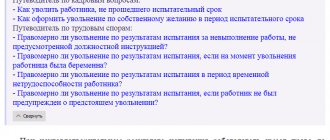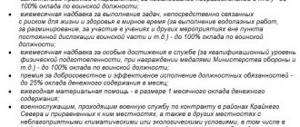Termination of a relationship is not always painful and sad; sometimes it is natural and fully meets the interests of both parties, especially when it comes to the “employee-employer” relationship. Termination of the contract is provided for and strictly regulated in the legislation of the Russian Federation, and the list of reasons for this is exhaustive. This means that new clauses cannot be added to it, even if they are justified by other regulations.
Question: In what order and on what grounds can the general director and employees be fired if an organization has learned of its upcoming exclusion from the Unified State Register of Legal Entities by the tax inspectorate due to unreliable information? View answer
However, compared to the “old spill” versions of the Labor Code, there are significantly more grounds for dismissal, which is a definite plus for the employer and expands the scope of action for employees. Today there are 18 of them in the Labor Code. The main thing is that these grounds are used lawfully, which is especially important if you need to get rid of an employee who does not want such an outcome.
On what grounds can an employee be dismissed at the initiative of the employer ?
Let's consider all the grounds for dismissal of employees provided for by the modern Labor Code of the Russian Federation, with special emphasis on the initiative of the employer.
Whose will is determining
Whether the grounds for dismissal belong to one of the following groups depends on which party expresses a desire to end the relationship.
- Employee initiative.
- Employer's desire.
- The reason does not depend on either party.
- The parties came to an agreement.
ATTENTION! A separate point can highlight the reasons for dismissal related to significant changes in the terms of the employment contract and, accordingly, the employee’s refusal to accept them: on the one hand, the employee of his own free will does not want to put up with inevitable changes, on the other hand, without the employer’s will to change, the employee would not have to refuse.
Who can't be fired
Types of dismissals carried out not due to the termination of the organization’s activities cannot be applied to the following categories of citizens:
- pregnant women;
- women who have one or more children under the age of 14 (up to 18) years or a disabled child, while being single mothers;
- citizens who have a child under three years of age and are raising him alone;
- persons under the age of majority.
If the manager wishes to terminate the employment relationship with anyone belonging to the category of the population mentioned in the list, then he can do this only with their consent.
Rights of a dismissed employee
An employee dismissed on the basis of any article of the Labor Code has the right to:
- payment of wages in full on the day of dismissal;
- compensation for vacation days that were not used by him;
- payment for sick leave (if any);
- receiving a work book with the corresponding entry.
What are the special grounds for dismissing a foreign employee ?
Additional payments, severance pay and compensation provided for certain reasons for dismissal, in each case have their own legislative justification (we do not consider this issue here).
Payments and compensations
Regardless of who initiated the termination of the working relationship, the following payments must be made to the employee on the last working day:
- wages for days worked;
- compensation for unused vacation;
- bonuses and payments provided for by the collective agreement or other internal documents of the company.
It is worth noting that in some cases the employer is legally required to pay a dismissed employee severance pay. Thus, in the event of a layoff, the dismissed person retains his salary for the period of employment up to three months after the layoff (Article 178 of the Labor Code of the Russian Federation). He is also entitled to severance pay, the amount of which, as a general rule, is the average monthly salary (Part 4 of Article 178 of the Labor Code of the Russian Federation). But there are exceptions:
- the amount of compensation may be greater if this is provided for in the collective labor agreement;
- seasonal workers receive two-week earnings (Part 3 of Article 296 of the Labor Code of the Russian Federation);
- employees under a fixed-term contract concluded for a period of up to 2 months do not receive benefits (Part 3 of Article 292 of the Labor Code of the Russian Federation);
- Individual entrepreneurs and religious organizations independently determine the amount of benefits (part 2 of article 307 and part 2 of article 347 of the Labor Code of the Russian Federation).
In addition to payments, on the last day of work, the dismissed person must receive his work book and other documents related to work (orders, certificates, etc.). If he cannot come for them in person, all documentation can be sent to him by mail with the written consent of the former employee.
Sample resignation letter
Sample letter of dismissal for absenteeism
The employee's desire is the law
Art. 80 of the Labor Code of the Russian Federation is the simplest and most “grounded” of all reasons to terminate cooperation. It does not require any explanation or additional conditions: no one can force another person to work if he does not want to. To resign from a position at your own request, it is sufficient to express this desire in writing 14 days before the date of departure. In some cases, this period may be reduced or even not required at all:
- upon dismissal from the probationary period;
- during sick leave;
- from maternity leave;
- by agreement with the employer.
If, before the expiration of 14 days, the employee changes his decision and wants to remain in his position, he has the right to withdraw his application or write a new one, canceling the first one.
FOR YOUR INFORMATION! The employer's consent is not required for voluntary dismissal; a written notice (application) is sufficient. If the manager refuses to accept it, the law provides for the employee the opportunity to send an application by mail with automatic termination of work after the legal two weeks.
Grounds for dismissal of an employee at the employee’s initiative
According to clause 3, part 1, art. 77 of the Labor Code of the Russian Federation, an employee can resign at his own request, and the procedure for terminating the contract in this case is described in Art. 80 Labor Code of the Russian Federation. The following circumstances may be the reason:
- intention to get a job in another company;
- moving;
- disagreement with changes in working conditions;
- illness that prevents further performance of official duties;
- retirement;
- other circumstances.
The resignation letter must indicate the following:
- name of the organization, full name the leader and his position (who is addressed);
- FULL NAME. and the position of the applicant;
- document's name;
- request to terminate the contract on the basis of Art. 80 Labor Code of the Russian Federation;
- date of dismissal;
- signature with transcript and date.
The employee is not required to report on the reasons for his departure, however, Article 80 of the Labor Code of the Russian Federation establishes the only rule that he must follow - to notify the employer of his decision two weeks in advance. This period begins the day after the employer receives the resignation letter, which may be:
- delivered to the manager personally;
- sent by registered mail with notification;
- sent by email, if the letter is certified by the employee’s electronic signature;
- sent by telegram certified by the operator, who must verify the identity of the sender.
In some cases, the two-week period of “working off” can be reduced: for example, if the parties were able to agree on early termination of the contract, if the employee is engaged in seasonal work or is on a probationary period. In this case, you need to notify management three days in advance (Articles 71 and 79 of the Labor Code of the Russian Federation).
The legislator also provided for an increased notice period for the employer for a certain category of employees. For example, if the general director decides to leave his post, then he must notify the highest management body of the organization of his intention one month in advance.
Agreement between the parties upon dismissal of an employee
Agreement of the parties (Article 78 of the Labor Code of the Russian Federation) is the basis for dismissal, which also has the fewest pitfalls. If both parties have agreed to terminate cooperation, this means that there is no mutual dissatisfaction between them that could become a reason to challenge the dismissal.
This basis comes into effect when the employee’s decision to leave his position must necessarily be supported by the employer’s consent. This situation may arise if the resigning employee, for example, is working under a fixed-term employment contract, the term of which has not yet expired.
The same reason may include the transfer of an employee to another employer by mutual consent.
Since the “leitmotif” of separation is the general decision of the parties, they also agree on all related issues, in particular, on the date of termination of cooperation.
Dismissal due to staff reduction
The type of staff layoff due to staff reduction is one of the most difficult ways to end the relationship between employer and employee. As a rule, in this case, employees find themselves in a difficult financial situation, which causes them obvious dissatisfaction.
For this reason, when terminating an employment contract, it is important to carry out all procedures comfortably for employees. Then it will be possible to avoid lawsuits and the spread of negative information about the company.
The reduction is carried out in the following order:
- An order to reduce staff is created.
- A commission is appointed to determine the priority right to retain positions and to resolve labor disputes.
- A deadline is set for notifying employees of layoffs. It must be at least 2 months. If massive layoffs are expected, then at least 3 months. All these months, the employer must maintain the position of the employee, provide him with work activity and pay.
- A dismissal order is issued. This document must be dated so that the 2-month period stated in the law remains.
All documents must be given to employees against signature. Otherwise, any person will have a reason to file a claim in court about a violation of his rights. At the same time, filing one claim can provoke an avalanche of litigation.
Advice. If the employer’s business is risky or the company is just beginning to develop, then it is better to transfer some of the responsibilities to HR outsourcing. That is, some amounts of work will be performed not by the company’s employees, but by employees of other organizations under a contract. In this case, the employer can partially work them, but will also be able to refuse their services at any time.
"Nothing personal"
Some of the reasons for which an employee may be dismissed from his position do not depend in any way on himself or on the employer. These include the following situations.
- The employee is called up to join the armed forces or to alternative service replacing the army.
- If by decision of a court or labor inspectorate an employee who previously occupied it and was unfairly dismissed is reinstated to a position, then the employee currently working is naturally dismissed unconditionally.
- A court verdict has entered into force, prohibiting or excluding the possibility of holding the previous position.
- If the position is to be filled by election, but the employee was not elected.
- Medical justification (total permanent disability, confirmed by an appropriate conclusion).
- Extraordinary circumstances recognized as such by a decision of the Government of the Russian Federation or a regional government body (martial law, disasters, natural disasters, social upheavals, serious accidents, epidemics, etc.).
- Death of the employee or employer (of course, we can only talk about an individual). The recognition of any of these persons as missing or dead by court is also equivalent to this.
IMPORTANT INFORMATION! Reasons for dismissal that do not depend on the will of the parties come into force if it is impossible to transfer the employee to another position or he does not agree to this.
Reasons for the director's departure
If ordinary employees have the right to quit after working for 2 weeks, then for the head of the enterprise the dismissal process is more complicated. Adhering to a similar scheme of actions, it will be necessary to take into account that, by virtue of his position, the director exercises full control over the activities of the enterprise and it will take time to complete the execution of powers and the proper transfer of affairs to the successor.
The grounds for parting with the head of the company are::
- Personal desire. The director is an employee and therefore has the right to exercise the right to leave the enterprise at his own discretion. The only requirement in this case is to submit a notice of resignation one month before the date of dismissal.
- If the director was on a fixed-term contract, sometimes to part with it it is enough to wait until the end of its term and not renew the document for a new term.
- At the initiative of the business owners, a unanimous decision is made that it is necessary to change the person leading the work of the enterprise. If the relationship breaks down for this reason, a separate agreement is drawn up, which stipulates the details of the dismissal.
If the company is owned by several owners, the decision to dismiss or dismiss the director is made at a general meeting.
Involuntary dismissal
Here we analyze the reasons for dismissal, which are associated with the employee’s reluctance to accept the changed working conditions. In this case, we are not talking about the employee’s desire to leave his position; he is forced to do so by circumstances that he has no power to change. These could be:
- offer of vacant positions due to changes in health status (offers may be unacceptable for the employee, although legal from the point of view of the Labor Code - Parts 3 and 4 of Article 73);
- significant changes in the terms of the employment contract without the employee’s consent (Part 4 of Article 74 of the Labor Code of the Russian Federation);
- reluctance to change the location of work if the employer moves to another location;
- refusal to work under another employer, i.e. when there is a change of owner or jurisdiction of the organization (Article 75 of the Labor Code of the Russian Federation).
IMPORTANT INFORMATION! The agreement or refusal of an ordinary employee in the last point is a key point, since for directors, their deputies and the chief accountant it can become an unconditional reason to leave their position at the initiative of the new employer.
All other categories of employees during a change of ownership or reorganization do not have the right to be dismissed on this basis, unless they refuse to continue working.
For what reasons can you fire an employee in 2021?
Articles on the topic (click to view)
- What to do and where to go if you are not paid upon dismissal
- What to do if you are laid off at work
- What to do if the employer does not want to fire at his own request
- What to do if the date of the dismissal order is later than the date of dismissal
- What to do if the employer does not give the work book after dismissal
- What to do if you didn’t work officially, you were fired, you didn’t get paid
- What is the employer obliged to give the employee on the day of dismissal?
There are no changes when dismissing an employee at his own request, but on the initiative of the head of the company the situation becomes more complicated. The Labor Code specifies in detail the reasons why an employee may be dismissed:
- At your own request.
- Pre-retirement age (when an employee cannot continue to work due to health reasons).
- Retirement.
- An employee’s admission to study at a university full-time.
- On agreement of the parties.
- Company bankruptcy.
- Due to staff reduction.
- In case of violation of official duties.
- Unsatisfactory result during certification.
- Theft and negligence at work.
At the same time, the employer is obliged to correctly record offenses by drawing up the appropriate documents (official and explanatory note, act of violation).
If the employee does not want to resign
The most “slippery” group of reasons for dismissal (Articles 71 and 81 of the Labor Code of the Russian Federation) is termination of contracts at the initiative of the employer. Most often, the employer’s wishes contradict the wishes of the employee himself, otherwise the dismissal would fall into another group - at his own request or by agreement of the parties. In cases where an employee not only leaves, but has to be fired, you need to be especially attentive to all the nuances of registration and legislative support for dismissal, because a dissatisfied employee will look for reasons to appeal, and if his claim is granted in court, the employer will face serious problems.
It is possible to get rid of an unwanted employee if his guilty actions are proven, and, in some cases, if there were no such actions. In each situation, the law regulates its grounds and procedure for dismissal.
We fire the culprit
The law provides a closed list of grounds for such dismissal. If there was an initiative by the employer, but the documents indicate a reason not included in this list, the dismissal will be considered illegal with all the ensuing consequences. What actions of an employee are considered guilty, giving legal grounds for his dismissal from his position?
- Failure to fulfill the duties specified in the employment contract in the presence of a disciplinary sanction . The presence of such a penalty indicates that violations were committed repeatedly. Clause 5 of Article 81 of the Labor Code of the Russian Federation states that this basis can only be applied within a year after the imposition of a disciplinary sanction (only in this case will the repeated offense be proven). Dismissal will be made for repeated failure to fulfill job duties.
- Gross violation of duties, committed even once. Such serious violations include:
- absenteeism;
- disclosure of secrets protected by law;
- theft, embezzlement, damage to property at the place of work, proven in court;
- violation of labor protection requirements with serious consequences (accident, accident due to the fault of the employee or their threat);
- being at work “under the influence” or in a narcotic trance.
- Documentary lies when concluding an employment contract (providing falsified documents or fraudulent information).
For certain categories of workers, the list of culpable actions is further expanded:
- an employee with educational functions committed an immoral act;
- the head of an organization or branch or the chief accountant made an incorrect decision due to which the organization suffered damage;
- a financially responsible employee did something that caused management to lose confidence in him.
Not guilty, but can't work
An employer can part with an employee when the latter no longer suits him for objective reasons. It is possible that the dismissal occurs not due to the personal qualities of the employee, but due to the circumstances that forced the employer to choose him as the person to be dismissed. The absence of the employee’s fault in the presence of the employer’s initiative can provoke dismissals in the following cases.
- The number or staff of the enterprise is being reduced (clause 2 of Article 81 of the Labor Code of the Russian Federation). The employer needs to be careful that an employee from a socially protected category is not laid off during periods prohibited for this, as well as having priority, other things being equal, selection. For such dismissal to be valid, the person being released must receive 60 days' notice.
- Liquidation of a company or termination of the activities of an individual entrepreneur (clause 1 of Article 81 of the Labor Code of the Russian Federation). There will be no disagreement here - absolutely everyone is fired on this matter, including those in preferential categories, as well as people on sick leave and vacations.
- The employee ceased to correspond to the position or his work (clause 3 of Article 81 of the Labor Code of the Russian Federation). When it comes to non-compliance due to health conditions, the medical report plays the “first role”. But when the problem is the employee’s lack of qualifications, it must be proven. To do this, the employer must conduct a certification, based on the results of which such a decision can be made. Certification must be legal, that is, enshrined in the internal acts of the company, carried out by a special commission and applied not only to the employee about whom doubts have arisen, but also to all employees of this category. It cannot be sudden; according to the situation, it must be regular. If, according to the conclusion of the certification commission, the employee’s qualification level does not correspond to his position, he may be fired, despite all his reluctance.
- The employee did not complete the probationary period . This is the same discrepancy with the position held, only confirmed in a simpler way. In order to ensure that dismissal during the probationary period is not contested, care must be taken to ensure that cases are confirmed that the subject failed to cope with his duties. In practice, no one prohibits an employee who does not want to have a notice of dismissal in his work book as having failed the test, from resigning of his own free will or by agreement of the parties.
FOR YOUR INFORMATION! If an entrepreneur wants to part with an employee whose employment contract is expiring, he does not need to look for any reasons for this - it is enough to announce the termination of the contract due to the expiration of the term. If you ignore the end of a fixed-term contract and do nothing, the relationship will automatically be considered extended on an indefinite basis.
Employer's liability
The liability of enterprise managers who make unreasonable decisions to dismiss pre-retirees has been tightened.
In this case, dismissed citizens can file a complaint with the labor inspectorate or even file a lawsuit in court. The exact punishment is determined only by the court.
To do this, select one of the following options:
- a fine, the amount of which can reach 200 thousand rubles;
- public works, the duration of which is up to 360 hours.
Punishment can be applied not only to the company, but also to its officials who decided on the need for unjustified dismissal of a pre-retirement employee. The court evaluates both mitigating and aggravating circumstances.
Will pre-retirees be exempt from taxes? Find out here.
It is from the beginning of 2021 that criminal liability will begin to apply to directors who deliberately fire people in old age.
All such disagreements will be considered not only in court, but also by labor inspectors. They must, on the basis of a statement received from a dismissed citizen, conduct an inspection of the company to make sure that it is advisable to hold the director of the company accountable.
What payments are due to an employee upon dismissal? Answer in video:
The new law aims to change the mindset of employers, who must provide optimal conditions and new jobs not only for young professionals, but also for older workers who have good experience and the right skills for the job.
Employers are required to provide employees with opportunities for retraining. They should create special workplaces in companies that will be designed for older people.
Advice for employers regarding problematic dismissals
If an employee does not want to leave his job, and the employer no longer wants to cooperate with him, all the legal nuances and subtleties of such dismissal must be observed. In the process, problematic situations may arise related to the employee’s opposition to measures aimed at releasing him from his position. Let's consider how the employer should respond to them more correctly in order to achieve his goal without being at risk of being sued for illegal dismissal.
- Opposition to foreclosure . Disciplinary action is a prerequisite for dismissal for an employee’s guilty act committed repeatedly. However, it cannot be imposed without an explanation provided by the employee regarding his behavior. What to do if an employee refuses to provide an explanation or delays giving it in order to delay the imposition of a penalty, since it can only be applied within a month after the offense? In this case, the most reliable thing for the employer will be to create a special commission, the purpose of which will be to identify the cause and degree of guilt of the employee. Based on the results of the protocol, a report on the guilt (or innocence) of the employee is drawn up, and he is invited to participate in the meeting. If he refuses to sign an act establishing his guilt, then the commission members, consisting of 3 people, will attest in writing to this refusal, which is sufficient evidence for the court. The same procedure must be followed if the employee does not sign the notice of dismissal order.
- The employee refuses to receive the required funds upon dismissal . By law, all necessary compensation and wages must be given to the employee on the day of dismissal. If this is not done, it may be considered illegal. If an employee refuses to receive funds without signing the appropriate statement, the employer has the right to deposit them into his account and notify him of this by registered mail, or send them by postal order. Documents confirming the transfer of funds are recognized by the court.
- The employee does not pick up the work book . You need to send him an invitation by mail with a notification to come and receive your document. This will remove the risk of accusations that the book is not given to the employee.
- The employee took sick leave before being fired. A person on sick leave cannot be fired. Even if the dismissal order was issued before the notice was opened, the dismissed person can claim in court that at the time of dismissal he was on sick leave, which will actually be true. In such a difficult case, the employer can act according to one of the following schemes:
- if the employee filed such a claim, you can file a counterclaim claiming the illegality of the sick leave (if it was issued with violations, the court will declare it invalid, and the basis for the employee’s claim will automatically disappear);
- you can make changes to the dismissal order by writing the date following the end of the sick leave specified in the document provided by the employee (this requires an additional order to make changes and, of course, recalculation of severance payments);
- You can replace the basis for dismissal in the order if the employment contract stipulates the need to promptly inform the employer about your absence due to illness (then unexpectedly appearing sick leave becomes a violation of labor discipline).
With these measures, the employer minimizes the risks associated with a problematic dismissal if it is not possible to reach a reasonable compromise, which is still the best option.
What is it for?
The employment regulations are required to be able to carry out the procedure for employing workers according to a unified scheme. The document allows you to avoid the emergence of controversial situations with regulatory authorities and employees.
If during the inspection, violations of administrative legislation are revealed, then punishment is applied to the violator.
The regulation is a type of local regulatory act. It may include items not reflected in the legislation.
It is being developed to capture the nuances that may arise in labor relations. Most often, the regulations reflect clauses on the probationary period that is established for employees.
The features inherent in the personnel selection procedure, the types of agreements, the grounds and conditions included in them are indicated.
When a person gets a job at an enterprise, the employer has the right to demand the provision of additional documentation not reflected in Article 65 of the Labor Code, provided that this is enshrined in the Regulations. In other cases, compliance with the employer's requirements is not necessary.
Conflict-free personnel turnover will occur when the document takes into account the wishes of the inspection body, as well as the trade union.
General information
The Labor Code stipulates the reasons for dismissal. Dismissal must be in accordance with the Labor Code of the Russian Federation, and all the requirements provided for therein must be met.
Otherwise, the employee has the right to contact the labor inspectorate with a claim and demand payment of compensation. Or it is possible to subject the employer to penalties, or to be reinstated.
Personnel services must draw up documentation in accordance with all legal acts and regulations of the Russian Federation. All procedural steps must be followed, depending on the grounds for which the employee was dismissed.
The dismissal of representatives of the management team is regulated by Art. 278 of the Labor Code of the Russian Federation, but since the current legislation is updated and adjusted annually, personnel employees need to carefully monitor all changes not only to the article itself, but also to the comments attached to each of its paragraphs, in order to avoid possible troubles and litigation in connection with improper dismissal .
- Law and comments to it
- Interpretation of Art. 278 Labor Code of the Russian Federation
- Explanation of the article
- Guarantees and recommendations
Guarantees and recommendations
Guarantees for the head of a department, division or organization are prescribed in Article 279 of the Labor Code of the Russian Federation, and their main essence is not only to prevent arbitrariness and discrimination of a manager upon dismissal, but also to protect him from possible negative consequences that may occur after settlement in connection with with loss of basic income. In general, we are talking about the following guarantees for the resigning employee:
- Cash compensation commensurate with average earnings for the last 6-12 months of service (the exact amount or an individual formula for calculating it can be specified in the TD);
- The decision to dismiss rests with the owner or his trustee/manager, as well as the relevant bodies of the legal entity;
- Involvement in material/criminal liability becomes possible only if there is evidence of the manager committing unlawful actions or his criminal inaction;
- The amount of monetary compensation not specified in the TD is determined by Article 279 of the Labor Code of Russia.
In turn, the legislative bodies have developed a list of recommendations for employers, familiarization with which will help avoid making the most common mistakes when concluding an employment contract for the position of head of an organization.
We are talking about points recommended for inclusion in the TD before submitting it for review and signature to the person hired, according to which he may be dismissed from a leadership position in the future:
Expert opinion
Gusev Pavel Petrovich
Lawyer with 8 years of experience. Specialization: family law. Has experience in defense in court.
By writing these and any other recommendations into employment contracts, business owners insure themselves against troubles and litigation that may arise when members of the management team are dismissed.
In addition to the grounds provided for by this Code and other federal laws, an employment contract with the head of an organization is terminated on the following grounds:
1) in connection with the removal of the head of the organization - the debtor in accordance with the legislation on insolvency (bankruptcy);
2) in connection with the adoption by the authorized body of a legal entity, or the owner of the organization’s property, or a person (body) authorized by the owner of a decision to terminate the employment contract. The decision to terminate an employment contract on the specified basis in relation to the head of a unitary enterprise is made by the body authorized by the owner of the unitary enterprise in the manner established by the Government of the Russian Federation;
3) has become invalid. — Federal Law of July 3, 2016 N 347-FZ.
In addition to the grounds provided for by this Code, including the grounds provided for in part one of this article and other federal laws, the grounds for termination of an employment contract with the head of an organization may be:
1) non-compliance with the maximum level of the ratio of the average monthly salary of a deputy head and (or) chief accountant of a state extra-budgetary fund of the Russian Federation, a territorial compulsory health insurance fund, a state or municipal institution or a state or municipal unitary enterprise and the average monthly salary established in accordance with Article 145 of this Code salaries of employees of a given fund, institution or enterprise;
2) other grounds provided for in the employment contract.
Features of dismissal of the head of the organization
The management of a company can be dismissed quite legally, without explaining the reasons for such an action (Article 268 of the Labor Code). Such a decision is made by a higher authority or board of directors-owners.
After a meeting of the board of directors or based on an executive document:
- The head of the organization relinquishes his authority.
- The dismissal order is issued by the council.
Dismissal is processed in several stages:
| Steps | Description |
| 1. | Meeting of company shareholders or board of directors |
| 2. | Recording the number of people present and their speeches |
| 3. | Making a decision on dismissal through open or closed voting |
| 4. | Formation of an order for the transfer of powers and dismissal |
| 5. | Familiarization of the manager with the contents of the order (under signature) |
| 6. | Transfer of material assets that were assigned to the manager according to the acceptance certificate |
| 7. | Entry in the work book about dismissal |
| 8. | Payment of monetary compensation and issuance of a work book |
Important! You simply need to follow the procedure, which will turn the process of dismissing a manager without reason into a correct and legal action.










